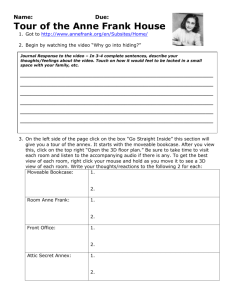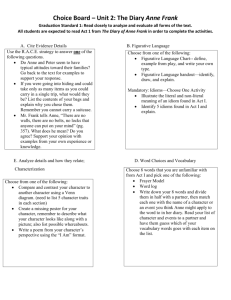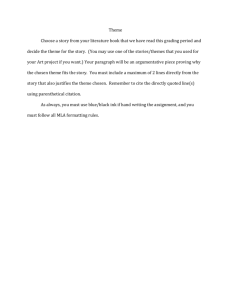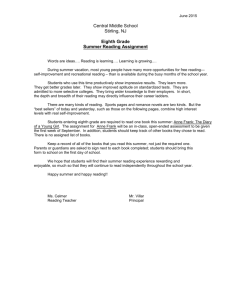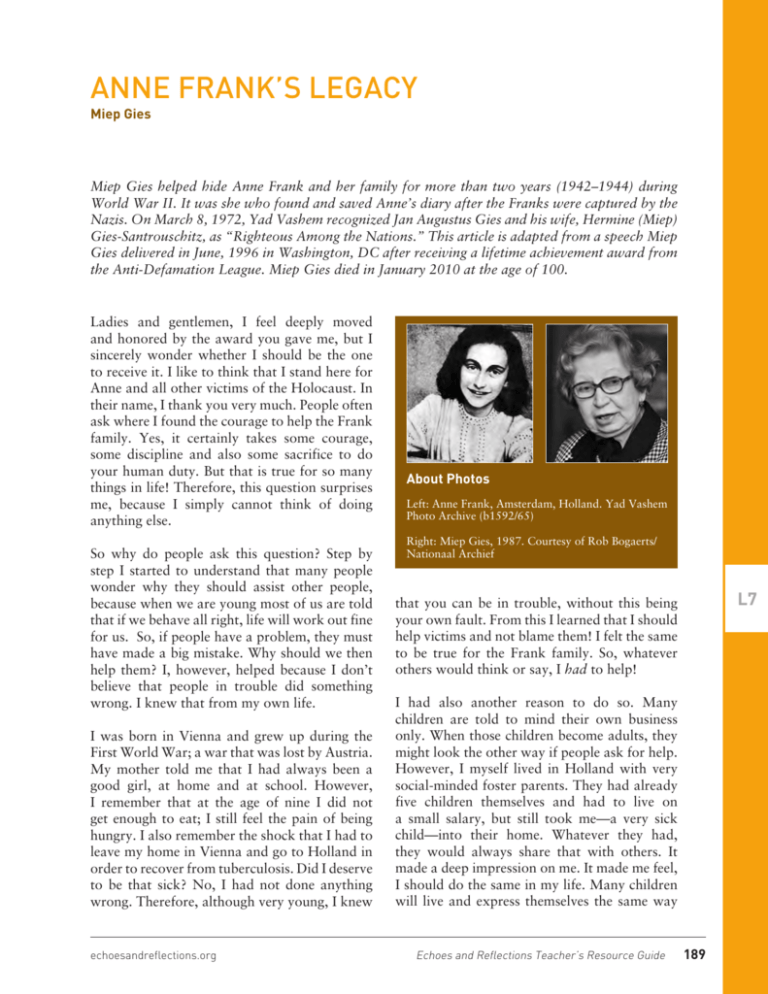
ANNE FRANK’S LEGACY
Miep Gies
Miep Gies helped hide Anne Frank and her family for more than two years (1942–1944) during
World War II. It was she who found and saved Anne’s diary after the Franks were captured by the
Nazis. On March 8, 1972, Yad Vashem recognized Jan Augustus Gies and his wife, Hermine (Miep)
Gies-Santrouschitz, as “Righteous Among the Nations.” This article is adapted from a speech Miep
Gies delivered in June, 1996 in Washington, DC after receiving a lifetime achievement award from
the Anti-Defamation League. Miep Gies died in January 2010 at the age of 100.
Ladies and gentlemen, I feel deeply moved
and honored by the award you gave me, but I
sincerely wonder whether I should be the one
to receive it. I like to think that I stand here for
Anne and all other victims of the Holocaust. In
their name, I thank you very much. People often
ask where I found the courage to help the Frank
family. Yes, it certainly takes some courage,
some discipline and also some sacrifice to do
your human duty. But that is true for so many
things in life! Therefore, this question surprises
me, because I simply cannot think of doing
anything else.
So why do people ask this question? Step by
step I started to understand that many people
wonder why they should assist other people,
because when we are young most of us are told
that if we behave all right, life will work out fine
for us. So, if people have a problem, they must
have made a big mistake. Why should we then
help them? I, however, helped because I don’t
believe that people in trouble did something
wrong. I knew that from my own life.
I was born in Vienna and grew up during the
First World War; a war that was lost by Austria.
My mother told me that I had always been a
good girl, at home and at school. However,
I remember that at the age of nine I did not
get enough to eat; I still feel the pain of being
hungry. I also remember the shock that I had to
leave my home in Vienna and go to Holland in
order to recover from tuberculosis. Did I deserve
to be that sick? No, I had not done anything
wrong. Therefore, although very young, I knew
echoesandreflections.org
About Photos
Left: Anne Frank, Amsterdam, Holland. Yad Vashem
Photo Archive (b1592/65)
Right: Miep Gies, 1987. Courtesy of Rob Bogaerts/
Nationaal Archief
L7
that you can be in trouble, without this being
your own fault. From this I learned that I should
help victims and not blame them! I felt the same
to be true for the Frank family. So, whatever
others would think or say, I had to help!
I had also another reason to do so. Many
children are told to mind their own business
only. When those children become adults, they
might look the other way if people ask for help.
However, I myself lived in Holland with very
social-minded foster parents. They had already
five children themselves and had to live on
a small salary, but still took me—a very sick
child—into their home. Whatever they had,
they would always share that with others. It
made a deep impression on me. It made me feel,
I should do the same in my life. Many children
will live and express themselves the same way
Echoes and Reflections Teacher’s Resource Guide
189
their parents and teachers do. For instance, if
children hear their parents and teachers speak
about the Asians, the Blacks, the whites, the
Jews, the Arabs, whatever, they most likely will
begin to believe that all Asians, or all Blacks, or
all whites, or all Jews or all Arabs act the same.
It makes them blame the whole group, if one
of its members commits a crime. Imagine if this
would happen to us, because in our own group
of people are criminals too!
Once, in Germany, most children were never
told that they should always look at somebody
else as an individual. Instead, many Germans
used to talk about the Jews. Hitler knew that
many believe that those who come from another
country or have another color of skin cause all
problems. Therefore Hitler promised that he
would make Germany a country for “Aryans”
only and that was exactly what many Germans
wanted to hear.
Hitler also did other things that pleased
Germans. At the time Anne Frank was born,
Germany was in deep trouble and very poor.
Hitler knew that people in trouble often like
to blame others, even if it is their own mistake.
So, Hitler offered the Jew as scapegoat, which
millions of Germans gladly accepted. And that
was the way Hitler got the help he needed to kill
six million innocent Jews.
L7
We should explain to children that caring about
our own business only can be very wrong.
When in Germany, step by step, Jewish life
was destroyed, most people, all over the world,
looked the other way, because they thought that
it was safer to stay out. However, during the
Holocaust, not only did six million Jews die,
but ten times that number of non-Jews as well.
Not only Jews lost what they had, but others
lost billions and billions too. This proves that if
injustice happens to your neighbor, there is no
guarantee that it will not come to your home,
that it will stop at your doorstep! Therefore, we
should never be bystanders, because, as we have
seen 50 years ago, that can be very dangerous
for ourselves as well!
I feel very strongly that we cannot wait for
others to make this world a better place. No, we
190
Lesson 7: Rescuers and Non-Jewish Resistance
ourselves should make this happen now in our
own homes and schools by carefully evaluating
the manner in which we speak and by closely
examining the ways we form and express our
opinions about other people, particularly in the
presence of children. We should never forget
the victims of the Holocaust. I myself think of
the family Frank, the family van Daan and the
dentist Dussel. Van Daan and Dussel were the
names Anne gave them; their true names were
van Pels and Pfeiffer. Also, the helpers got other
names from Anne, except for me! Why did she
decide to use my own name? The answer I will
never receive, but it touches me very much. She
probably felt too close to me to alter my name.
Together with Jan, my husband, we were a
total of five helpers. We all had our own tasks.
In the morning I had to enter the hiding place
to pick up the shopping list. When I came in,
nobody would speak, just stand in line and
wait for me to begin. This was always an awful
moment for me, because it showed that these
fine people felt so dependent on us, the helpers.
They would silently look up to me, except for
Anne, who, in a cheerful tone, used to say,
“Hello Miep, what is the news?” Her mother
disliked this very strongly and I knew that the
other people in hiding would afterward blame
Otto for what they would call, “proof of a
too liberal upbringing!” What struck me most
about Anne was her curiosity. She always asked
me about everything that went on outside and
not only that! She knew that I had just married
and therefore she hoped that I would tell her
more about being so close with another person.
Well, I did not yield to that and that must have
disappointed her. However, usually I shared all
my information with her.
Anne felt very strongly about her privacy, which
I discovered when I once entered the room
where she was writing her diary. From her eyes
I saw that she was angry; maybe she thought
I was spying on her, which was not true, of
course. At that moment her mother came in and
said, when she noticed this tense situation: “Oh,
Miep you should know that our daughter keeps
a diary.” As if I did not know that: I was the one
who always gave her the paper. Anne closed her
diary with a bang, lifted up her head, looked at
echoesandreflections.org
me, and said, “Yes, and about you I am writing,
too.” Then she left, slamming the door behind
her. I hurried back to my office, quite upset.
However, usually Anne was a friendly and a very
charming girl. I say girl, but talking to her gave
me the surprising feeling of speaking to a much
older person. No wonder, since the situation
made Anne grow very quickly from child to
young adult. I did not pay much attention to
this, because there were all the other things, like
my daily care for 11 people: my husband and I,
eight in the attic and also a non-Jewish student,
wanted by the Germans, who we were hiding in
our home. Otto Frank did not know about this
student. He would have forbidden it. “You take
too much risk, Miep,” he would have said.
The children-in-hiding had a hard time. They
missed so much. They could not play outdoors
and could not meet with friends. They could
hardly move. We did all that was possible to
help them, but freedom we could not give them.
This was one of the most painful things for me.
Every year on the fourth of August, I close the
curtains of my home and do not answer the
doorbell and the telephone. It is the day that my
Jewish friends were taken away. I have never
overcome that shock. I loved and admired them
so much. During two years eight people had to
live together in a very small place. They had
little food and were not allowed to go out. They
could not speak to their friends and family. On
top of that came the fear, every hour of the day.
I have no words to describe these people who
were still always friendly and grateful. Yes, I do
have a word: They were heroes, true heroes!
People sometimes call me a hero. I don’t like
it, because people should never think that you
have to be a very special person to help those
echoesandreflections.org
who need you! I myself am just a very common
person. I simply had no choice, because I could
foresee many, many sleepless nights and a life
filled with regret, if I refused to help the Franks.
And this was not the kind of life I was looking
forward to. Yes, I have wept countless times
when I have thought of my dear friends, but I
am happy that these were not tears of remorse
for refusing to help. Remorse can be worse than
losing your life.
I could not save Anne’s life, but I could help her
live another two years. In those two years she
wrote her diary, in which millions of people find
hope and inspiration. I am also grateful that I
could save this wonderful diary. When I found
it, lying all over the floor in the hiding place, I
decided to stow it away, in order to give it back
to Anne when she would return. I wanted to see
her smile and her say, “Oh, Miep, my diary!”
But after terrible time of waiting and hoping,
word came that Anne had died. At that moment
I went to Otto Frank. Anne’s father, the only
one of the family who had survived, and gave
him Anne’s diary. “This is what Anne has left,”
I said to him. “These are her words.” Can you
see how this man looked at me? He had lost his
wife and two children, but he had Anne’s diary.
It was a very, very moving moment.
Again, I could not save Anne’s life. However,
I did save her diary, and by that I could help
her most important dream come true. In her
diary she tells us that she wants to live on after
her death. Now, her diary makes her really live
on, in a most powerful way! And that helps
me in those many hours of deep grief. It also
shows us that even if helping may fail to achieve
everything, it is better to try than to do nothing.
L7
This article first appeared in Dimensions: A Journal of
Holocaust Studies 11(1). © 1997 Anti-Defamation League.
All rights reserved.
Echoes and Reflections Teacher’s Resource Guide
191




